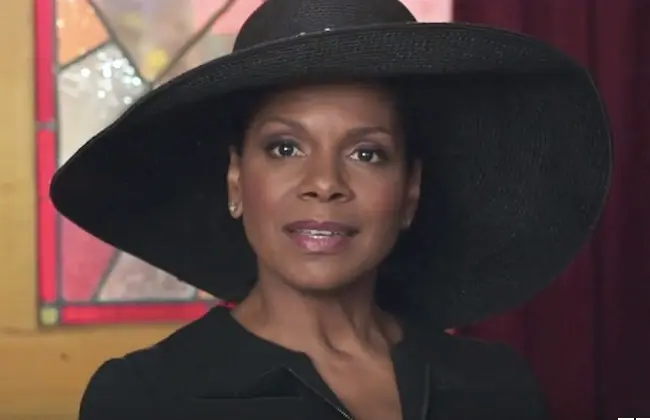Audra McDonald Quietly Owned The Good Fight This Season
-
 Audra McDonald shines as Liz Reddick on The Good Fight (CBS All Access)
Audra McDonald shines as Liz Reddick on The Good Fight (CBS All Access)The media discourse around The Good Fight in its third season has been largely focused on one of two things. The first is Michael Sheen, whose performance as a blustering, hammy Roy Cohn disciple named Roland Blum has -- by most accounts -- sucked the oxygen out of entire episodes. And then there are the animated School House Rock parodies, accompanied by music from songwriter Jonathan Coulton, which explain individual concepts introduced in each episode, from nondisclosure agreements to Russian content farms. (I am far less keen on these than most critics and fans.)
But alongside Sheen’s scenery-chewing and Coulson’s singing, there's been a constant, low-key tour-de-force: Audra McDonald’s performance as Liz Lawrence.
First introduced back in The Good Wife’s third season as a former law school rival of then-protagonist Alicia Florrick (Julianna Margulies), Liz Lawrence was a one-off AUSA that the show seemingly forgot. That is, until the Season 2 premiere of The Good FIght, when series creators Robert and Michelle King found a whole new purpose for the character, as the daughter of newly deceased civil rights legend Carl Reddick. Considering the central law firm of the series is Reddick, Boseman, and Lockhart, the latter two — Adrian Boseman (Delroy Lindo) and Diane Lockhart (Christine Baranski) — were looking for someone to take the Reddick slot as a named partner. A first-hesitant Liz ultimately agreed.
McDonald spent most of her first season fleshing out her character, who was originally an adversary for Diane, and later an ally. Likely due to scheduling conflicts, she was absent from several episodes, which may have been why she lacked a solid season-long arc.. At the time I wondered if the character might be hastily written out before Season 3, in much the same way Erica Tazel’s Barbara Kolstad was at the end of the first season.
Instead, both the Kings and McDonald brought Liz back in full force this season, upping the stakes for her character from the get-go. In the season premiere, Liz learned her father Carl was a sexual abuser who raped multiple women. Instead of making Liz’s reaction outsized and melodramatic, McDonald took a more subtle approach, channeling a quiet fury and disillusionment. At first she tried to be professional and work on settling and getting NDAs signed by the women involved in order to protect her father’s legacy (and the firm). Then she lashed out at Adrian, convinced he knew more than he initially let on. It’s a credit to McDonald that these two divergent paths felt wholly organic; she fully sold Liz’s pain manifesting in various ways.
In contrast to Sheen’s Roland -- a child’s worst temper tantrum made incarnate -- McDonald’s Liz has consistently been the adult in the room. In one episode in which the partners debate whether Maia Rindell (Rose Leslie) should be fired for a drug arrest that wasn’t her fault, Liz is at first sympathetic with Maia. In time, however, she sees how racial bias is affecting firm’s decisions and reckons with her own gentler treatment of Maia. Eventually, she votes to fire her. Again, McDonald plays this so effectively, it’s simultaneously a surprise ending yet makes total sense.
But nothing McDonald has done this season tops Liz’s monologue from the seventh episode, “The One Where Diane and Liz Topple Democracy.” The two leads have been participating all season in an underground #Resistance group that uses aggressive methods to attack President Trump. Episode seven brings their most direct yet: hacking voting machines to steal votes in the 2020 election. Diane is aghast at at the idea, but Liz isn’t immediately ready to walk away. When Diane argues that free and fair elections are the cornerstone of US history and democracy, Liz fires back:
”We share a lot of things, but we do not share histories. I have a college friend who was kicked off the voter rolls in Ohio. And my uncle was denied the right to vote in the last election in Wisconsin. At some point, these stories become more than just anecdotes. There’s something bigger. This democracy that you talk about? This doesn’t exist for a lot of us. It didn’t exist for my grandparents, it didn’t exist for my parents, and it is slowly being taken away from me. … So excuse me if I need a moment to reflect on this unique possibility. One person hits a few buttons, and suddenly black voters are reinfranchised. That means something very different to me than it does to you."
This whole speech is delivered at barely above a whisper, yet we hang on every word, because McDonald packs each syllable with raw emotion. In doiing so, Liz Lawrence makes an argument for voter hacking palatable. To quote a meme, “The power that that has.”
Michael Sheen can yell all he wants; McDonald is delivering far and away the performance of the season. On a show where the loud and brash tend to draw the most attention (usually for good reason), it’s the quietest work that’s making the biggest impact.
People are talking about The Good Fight in our forums. Join the conversation.
Kevin O'Keeffe is a writer, host, and RuPaul's Drag Race herstorian living in Los Angeles.
TOPICS: The Good Fight, CBS All Access, Audra McDonald, Michael Sheen